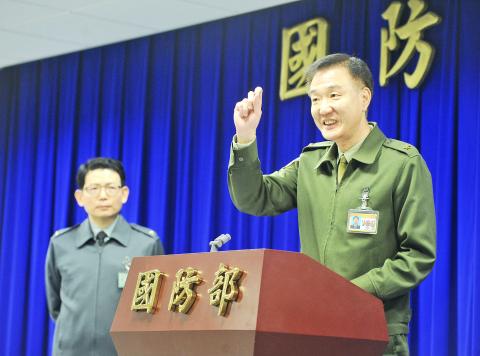The Ministry of National Defense yesterday issued a public apology over the controversy caused by military police going to a civilian’s home in connection with an investigation into the alleged online sale of classified government documents related to the White Terror era.
“The Ministry of National Defense would like to deeply apologize to the public for the concerns and uproar that the case has caused,” Political Warfare Bureau Director Wen Chen-kuo (聞振國) said during a morning news conference at the ministry. “We would also like to urge the public to discuss the matter rationally and objectively, so that the focus of the issue is not blurred.”
The ministry would ask the Control Yuan to investigate whether its Security Division or the Taipei Military Police made any administrative mistakes, and prosecutors have also been asked to investigate the matter, he said.

Photo: CNA
“There is a difference between having a document as part of a personal collection and putting it up for public auction,” Wen said. “Selling classified documents from the government’s archives could jeopardize national security and contravene the law.”
Classified documents should be placed in the care of the relevant government units or police, the ministry said, adding that the online auction of such documents is inappropriate.
Military Police Command Chief of Staff Feng Yi (馮毅), who also took part in the news conference, said that no actual search was conducted by military police officers of the civilian’s home.
“Military police received a tipoff that a man, surnamed Wei (魏), was selling classified documents online and they subsequently launched an investigation,” Feng said. “Because the probe was still in an early stage, no actions, such as applying for a search warrant, were taken.”
Posing as potential buyers, the investigators met with Wei at his home and he handed them the documents, which were stored in a damp-proof cabinet, Feng said, adding that Wei had given the officers a signed consent form before he gave them the documents.
However, Wei has said that he only handed over the documents after being threatened with prosecution for concealing them and for leaking state secrets.
Captain Chan Kuo-yi (詹國毅) of the ministry’s Security Division said that an initial probe found that Wei had sold three declassified documents online.
The documents should have been destroyed after they were declassified, but were probably smuggled out, Chan said.
Defense ministry spokesman Major General David Lo (羅紹和) told the news conference the case did not involve any Taiwanese or Chinese spies.
However, his statement contradicted remarks made on Sunday by Hsieh Ming-te (謝明德), the top political warfare officer at the Military Police Command, who told reporters that the documents in question were related to communist Chinese spies and their confessions after they surrendered to the Chinese Nationalist Party (KMT) government in the 1960s and 1970s.
Ministry officials said that Wei’s case is now being investigated by the judiciary and that the ministry would cooperate.
Five military police officers involved in the Wei investigation were summoned yesterday by the Taipei District Prosecutors’ Office for questioning. Details of the questioning were not revealed by the military police officers or the prosecutors’ office.
Additional reporting by Loa Iok-sin

‘DENIAL DEFENSE’: The US would increase its military presence with uncrewed ships, and submarines, while boosting defense in the Indo-Pacific, a Pete Hegseth memo said The US is reorienting its military strategy to focus primarily on deterring a potential Chinese invasion of Taiwan, a memo signed by US Secretary of Defense Pete Hegseth showed. The memo also called on Taiwan to increase its defense spending. The document, known as the “Interim National Defense Strategic Guidance,” was distributed this month and detailed the national defense plans of US President Donald Trump’s administration, an article in the Washington Post said on Saturday. It outlines how the US can prepare for a potential war with China and defend itself from threats in the “near abroad,” including Greenland and the Panama

A wild live dugong was found in Taiwan for the first time in 88 years, after it was accidentally caught by a fisher’s net on Tuesday in Yilan County’s Fenniaolin (粉鳥林). This is the first sighting of the species in Taiwan since 1937, having already been considered “extinct” in the country and considered as “vulnerable” by the International Union for Conservation of Nature. A fisher surnamed Chen (陳) went to Fenniaolin to collect the fish in his netting, but instead caught a 3m long, 500kg dugong. The fisher released the animal back into the wild, not realizing it was an endangered species at

The High Prosecutors’ Office yesterday withdrew an appeal against the acquittal of a former bank manager 22 years after his death, marking Taiwan’s first instance of prosecutors rendering posthumous justice to a wrongfully convicted defendant. Chu Ching-en (諸慶恩) — formerly a manager at the Taipei branch of BNP Paribas — was in 1999 accused by Weng Mao-chung (翁茂鍾), then-president of Chia Her Industrial Co, of forging a request for a fixed deposit of US$10 million by I-Hwa Industrial Co, a subsidiary of Chia Her, which was used as collateral. Chu was ruled not guilty in the first trial, but was found guilty

The Chinese Nationalist Party (KMT) is maintaining close ties with Beijing, the Democratic Progressive Party (DPP) said yesterday, hours after a new round of Chinese military drills in the Taiwan Strait began. Political parties in a democracy have a responsibility to be loyal to the nation and defend its sovereignty, DPP spokesman Justin Wu (吳崢) told a news conference in Taipei. His comments came hours after Beijing announced via Chinese state media that the Chinese People’s Liberation Army’s Eastern Theater Command was holding large-scale drills simulating a multi-pronged attack on Taiwan. Contrary to the KMT’s claims that it is staunchly anti-communist, KMT Deputy